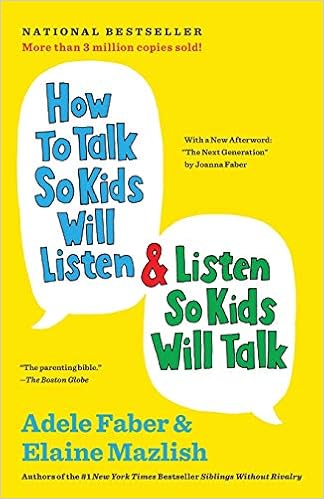These conversation starters for kids are irresistibly good. You’ll have your child laughing and opening up as they share with you their thoughts, feelings, and fears. You’ll love your newfound parent-child relationship as you ask your child these questions.
You’re having difficult conversations with your child, from topics such as global events or family relationships. These issues are close to your heart and may leave you at a loss for words.
But studies have shown that the way a child learns how to interact with the world around them is through the conversations they have with their parents.
Children need to feel like they’re being heard and their feelings validated, and it’s important that these needs are met through you.
As a mom of 4+ kids I know which questions to ask to have a child thinking deeply, laughing until their belly hurts, or opening up in an environment where they feel safe.
The purpose of these questions is to invite your son or daughter to open their heart and let you in their world.
This post may contain affiliate links. Thank you for your support. Disclosure Policy
These questions are designed to invite your child to share their thoughts and feelings with you, so you can gain a better understanding of their heart.
How To Develop Debate Skills
These questions invite your child to express their viewpoints in a safe, non-judgmental environment.
- Would you rather eat ice cream all day or play on your bike?
- Would you rather be Batman or Tarzan?
- Would you rather eat your least favorite vegetable or have extra homework?
- Would you rather always scream or always whisper?
- Would you rather live in a house shaped like a circle or a house shaped like a triangle?
- Would you rather have a new silly hat appear in your closet every morning or a new pair of shoes appear in your closet once a week?
- Would you rather always be dressed up or always wear your pajamas?
- Would you rather discover a hidden treasure or discover a living dinosaur?
- Would you rather never have any homework or be paid $10 per hour for doing your homework?
- Would you rather live on the Moon or live on Mars?
How To Develop Imagination
Children’s imaginations are wonderful, especially when they’re young. We all remember when we would turn a bed sheet into a fort or a ghost costume.
This is why it’s important to embrace the creative imaginations of your children through questions like:
- If you were to build your own castle, what would it look like?
- If you could invent any national holiday what would it be?
- If you could star in your own movie, what would it be about?
- If you could change one family rule, what would you change?
- If you were invisible for a day, what would you do?
- If you were in a band, what instrument would you play and why?
- If you could change your name, what would you name yourself and why?
- If your pet could talk, what would it say?
- If you had a million dollars, what would you spend it on?
- If you could ask God one question right now, what would it be?
Want To Remember Your Child’s Answers? Then You’ll Love The Loom Journal!
“I can’t think of a more fun, beautiful, and permanent way to document your growing connection with your child. The prompts encourage conversation and connectivity, and it’s all preserved in a beautiful, heirloom quality book. It’s genius.”
Natalie, happy customer
How To Develop Personal Opinions
Has your child felt lost in a room full of people? Sometimes it’s hard for them to find their own voice.
Children need to discover who they are and what they like, outside the influencing opinions of family and friends. Helping your child develop this skill can be as simple as asking the following questions.
- Who is your favorite superhero/princess?
- Who is the better swimmer: Nemo or Arial?
- Who saves the day from disaster better. the Paw Patrols or Peppa Pig?
- Who has better superpowers, Elsa from Frozen or Superman?
- If you could be any cartoon character, which would it be and why?
- If you could make a rule for the day, and everyone had to follow it, what would it be?
- What superpower would you like to have?
- If you could be an animal for a day, which would it be and why?
- What is the best way to eat an Oreo?
- If you had a robot for a day, what would you ask it to do?
- If your favorite toy could talk, what would it say?
- What would you do if you found a pot of gold at the end of the rainbow?
- What makes you feel loved?
- What is one thing you wish you could tell your parents, but have felt nervous or scared to?
- What’s your favorite thing to do as a family?
How To Develop Curiosity & Deductive Reasoning
Your child is learning about the world around them, whether the subject includes science, global events, art, or relationships.
These conversation starters encourage them to learn from you, study a subject on their own, or embed within them a desire to keep learning.
Be willing to ask your child what they think, what they like or dislike about what they’re exploring in their world.
- What do you think happens when plants grow?
- What shapes can you see in the stars?
- What do you think the world will be like when you’re an adult?
- What’s the biggest problem in our world?
- What is something you want to do, but can’t yet?
How To Develop Spirituality
Children will ask life pursuing questions such as what happens after we die, where they came from, and their purpose in life.
Now, more than ever, our youth needs a higher purpose to give their lives meaning. They need to know how they can fight off unwanted peer pressure and how to say no to drug or early sexual experiences.
You can use the questions below to help them develop their faith in God and find their higher purpose.
- How do you know that God is near, or when/where do you feel His presence the most?
- What gifts do other people in your family have that are a blessing to you?
- What do you think about when you think of heaven?
- Why do you think God put us together as a family?
- How would you change the world when you grow up?
- What gifts do you have that you could use to bless others?
- If you knew today was your last day on Earth, what would you want to tell other people? What would you do that day?
- If God’s love was a color, what color would it be and why?
- What do you think is the coolest thing God ever made?
- When you think about Jesus giving his life for your sins, how does that make you feel?
How Do You Start A Conversation With A Child?
Children want to open up to their parents and talk though their feelings.
They don’t want to be lectured or told what to do unless they ask advice seeking prompts like, “What do you think?”
And as parents, listening is the most important role we can have in a conversation, including having a loving home, a safe listening environment, dedicated family time, and set boundaries.
And for the children who feel resentment and anger, those are the ones you need to love the most.
They’re hurting.
I don’t know your family situation, but I do know that when you extend love, set boundaries for yourself and your child, and try to connect with them, overtime they’ll open their hearts. And please never rule out seeking professional help. They have additional tools and resources that can bless your child.
When parents provide a loving environment where their children feel like they’re being heard, they are building a stronger relationship built on love and trust.
And sometimes the simplest moments are the ones you remember most.
YOU MIGHT ALSO LIKE: You’ll find an additional 200+ conversation questions for kids right HERE.
Learn How To Talk So Your Kids Will Listen

The ultimate “parenting bible” (The Boston Globe) is all about how to effectively communicate with your child from #1 New York Times bestselling authors and internationally acclaimed experts on communication between parents and children, Adele Faber and Elaine Mazlish.
This bestselling parental book includes fresh insights and suggestions as well as the author’s time-tested methods to solve common problems and build foundations for lasting relationships, including innovative ways to:
- Cope with your child’s negative feelings, such as frustration, anger, and disappointment
- Express your strong feelings without being hurtful
- Engage your child’s willing cooperation
- Set firm limits and maintain goodwill
- Use alternatives to punishment that promote self-discipline
- Understand the difference between helpful and unhelpful praise
- Resolve family conflicts peacefully
You can grab a copy of this book HERE or if you prefer audio books, you can listen to a copy on Audible HERE.

Micah Klug is a wife, homeschooling mother to five children, and author. She teaches time-tested solutions to help parents remember what matters most in life, including strengthening their home, faith, and family relationships. To learn how a child who grew up in an authoritarian home is now creating an environment of peace and joy in her own home visit this page. If you want to contact Micah, send her an email here or email [email protected].









